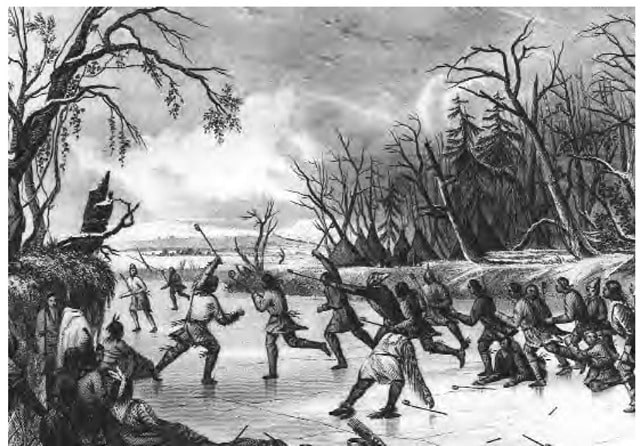The Abenaki tribe is a Native American tribe and one of the Algonquian-speaking peoples. They Lived in parts of Canada and the Northeast United States until being pushed west during American expansion. Unlike some of the more powerful Indian tribes, the Abenaki were fragmented into different subsets. They were spread throughout the Northeast without any central leadership. After the first contact with the Europeans, they eventually began to merge due to necessity. Their population was decimated by European disease and war.
Jump to:
Abenaki Tribe Facts: Iroquois and European Contact
The Abenaki were spread throughout the northeastern United States and came into contact with English colonists when they began to settle in the New England Colonies. As new colonists came into New England, many of the Abenaki relocated to Quebec, while a small portion stayed in the colonies and traded with the English.
This was not the first contact with expansionist in their native land. Prior to European contact, the Iroquois tribe was beginning to build their own empire and expand into the Abenaki lands. The Iroquois were an imperialist, expansionist culture whose cultivation of the corn/beans/squash agricultural complex enabled them to support a large population. They made war primarily against neighboring Algonquian peoples, including the Abenaki. The Abenaki seemed to be to handle the powerful Iroquois due to their own adoption of agriculture. They were able to support a large population and provide sufficient warriors for defense.
The Abenaki tribe largely supported the French during the colonial wars. They sided with the Wampanoag tribe during the King Phillips War and then with the French during the French and Indian War. While they showed much courage and resourcefulness during these wars, they sided with the losers. This, combined with two infectious diseases that ravaged their population, pushed them farther north into New France. The French allocated two locations where they could settle and live peacefully.
The modern Abenaki tribe still exist in Canada and has developed a reputable Tourism economy in Quebec.
Abenaki Tribe Facts: Culture
The culture of the Abenaki tribe is similar to many of the Algonquian peoples. They are considered docile, ingenous, temperate in the use of liquor, and not profane. They cultivated crops for food and located their villages near a water source.
They lived in scattered bands of extended families for most of the year. Each man had different hunting territories inherited through his father. Unlike the Iroquois, the Abenaki were patrilineal. Bands came together during the spring and summer at temporary villages near rivers or somewhere along the seacoast for planting and fishing. These villages occasionally had to be fortified, depending on the alliances and enemies of other tribes or of Europeans near the village. Abenaki villages were quite small when compared to those of the Iroquois; the average number of people was about 100.
Most Abenaki crafted dome-shaped, bark-covered wigwams for housing, though a few preferred oval-shaped long houses. During the winter, the Abenaki lived in small groups further inland. The homes there were bark-covered wigwams shaped in a way similar to the teepees of the Great Plains Indians. During the winter, the Abenaki lined the inside of their conical wigwams with bear and deer skins for warmth. The Abenaki also built long houses similar to those of the Iroquois.
Like many Native American tribes, the Abenaki used storytelling as a way to preserve their history.

Abenaki Tribe Facts: Marriage
Abenaki men kept their hair long and loose, and when they began courting, a young Abenaki woman would put it in a ponytail. Upon marrying, the men would place leather around the ponytail and shave around the head. This symbolized their marriage, much like we use rings.
Changes in the hairstyle were symbolic of a complex courtship process. The man would give the woman a box made of fine wood, which was decorated with the virtues of the woman; the woman would give a similar box to the man. Everyone in the tribe must agree to the marriage. They erect a pole planted in the earth, and if anyone disagrees, he strikes the pole. The disagreement must be resolved, or the marriage does not happen.
Abenaki Tribe Facts: Online Resources
- Native Languages - Abenaki Tribe
- Wikipedia - Abenaki Overview
- Waban-Aki Nations - Official Website
- Big Orrin - Abenaki Information for Kids (helpful for adults, too)
- Abenaki Tribe Genealogy
- The History Junkie's Guide to Native American History
- The History Junkie's List of Native American Tribes
- The History Junkie's Guide to Colonial America
